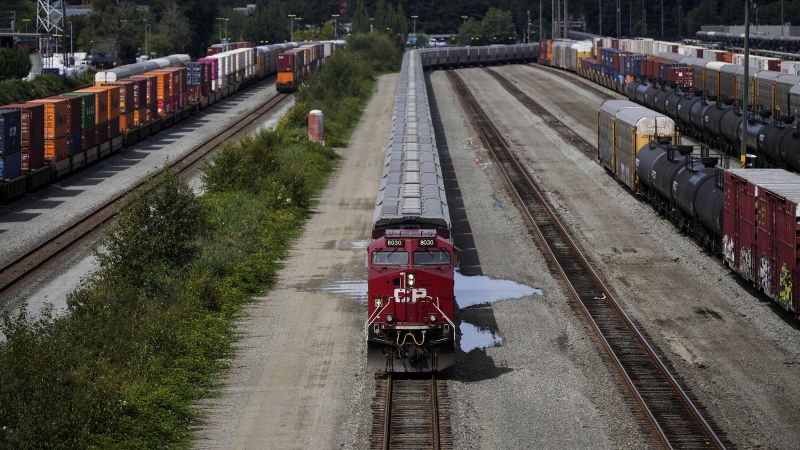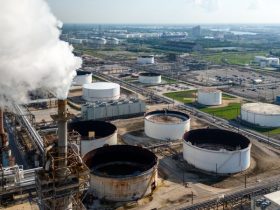Canada’s two major freight railroads have shut their operations, according to management of the two companies, locking out 9,000 members of the Teamsters union who operate the trains and dealing a potential blow to both the Canadian and US economies.
Nearly a third of the freight handled by the two railroads — Canadian National (CN) and Canadian Pacific Kansas City Southern (CPKC) — crosses the US-Canadian border, and the shutdown could disrupt operations in a number of US industries, including agriculture, autos, home building and energy, depending upon how long the shutdown lasts.
“CPKC is acting to protect Canada’s supply chains, and all stakeholders, from further uncertainty and the more widespread disruption that would be created should this dispute drag out further resulting in a potential work stoppage occurring during the fall peak shipping period,” the company said in a Thursday statement shortly after the start of the lockout at 12:01 am ET. “Delaying resolution to this labor dispute will only make things worse.”
The shutdown would drive home how closely linked the two nations’ economies are, with many industries depending on the free movement of goods across the border for their efficient operations.
For example, some US auto plants could temporarily shut down if they’re unable to get engines, transmissions or stampings done at Canadian plants. US farmers might find shortages of fertilizer and US water treatment plants near the Canadian border could run of out chlorine they use to purify water.
This is the first time that both major Canadian railroads have shut down at the same time due to a labor dispute. The most recent work stoppage in the industry was a 60-hour strike at Canadian Pacific in 2022. Before that, there was a nine-day strike at Canadian National in 2019.
Thursday’s action is different from a strike, in which the members of the union refuse to report for work. In this case, management is the one telling the nearly 9,000 union members that they can’t work.
CPKC spokesperson Patrick Waldron said it was better to stop operations now and reach a conclusion, rather than having the union go on strike later this fall.
“We’re right up against the fall peak shipping season. You have a new Canadian grain crop coming in, the first not impacted by drought in two years,” Waldron told CNN ahead of the lockout. “You have Christmas presents in containers arriving at ports. If this pushes further into fall shipping period, the consequences are going to be worse.”
The Teamsters union says it has been seeking a contract that both sides can live with, but that demands by the railroads would reduce the amount of rest and increase safety risks.
“Throughout this process, CN and CPKC have shown themselves willing to compromise rail safety and tear families apart to earn an extra buck. The railroads don’t care about farmers, small businesses, supply chains, or their own employees. Their sole focus is boosting their bottom line, even if it means jeopardizing the entire economy,” Paul Boucher, president of the Teamsters Canada Rail Conference, said in a statement early Thursday.
But the railroads deny that the changes they are seeking would increase safety risks, saying all proposals provide greater safety protections than required by recently strengthened Canadian regulations.
The companies said it is the union’s fault that there could not be an agreement reached before the deadline. They both called on the government to step in and refer the dispute to binding arbitration, which it has thus far refused to do.
This is a developing story. It will be updated.
Read the full article here













Leave a Reply